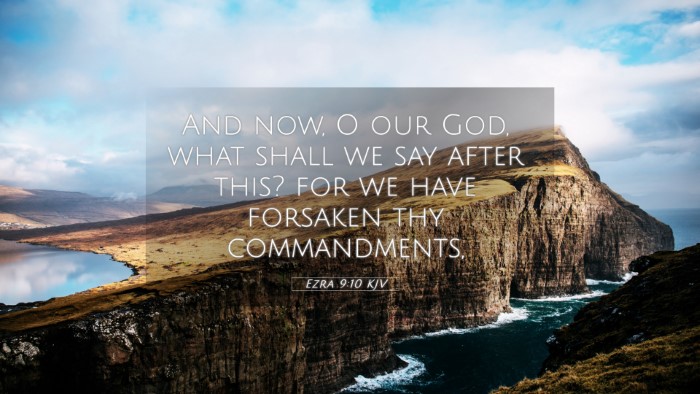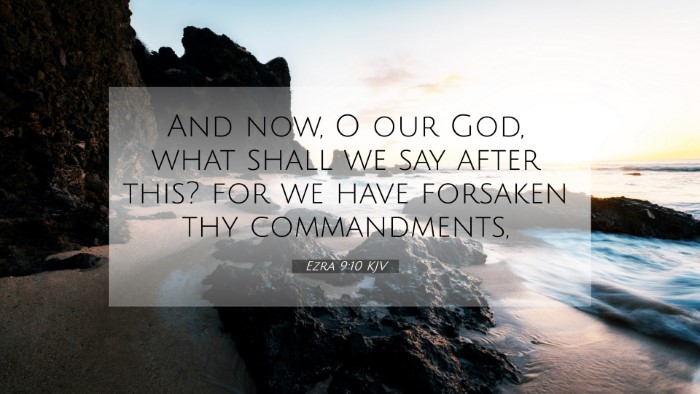Old Testament
Genesis Exodus Leviticus Numbers Deuteronomy Joshua Judges Ruth 1 Samuel 2 Samuel 1 Kings 2 Kings 1 Chronicles 2 Chronicles Ezra Nehemiah Esther Job Psalms Proverbs Ecclesiastes Song of Solomon Isaiah Jeremiah Lamentations Ezekiel Daniel Hosea Joel Amos Obadiah Jonah Micah Nahum Habakkuk Zephaniah Haggai Zechariah MalachiEzra 9:10 Similar Verses
Ezra 9:10 Cross References
And now, O our God, what shall we say after this? for we have forsaken thy commandments,
Uncover the Rich Themes and Topics of This Bible Verse
Listed below are the Bible themes associated with Ezra 9:10. We invite you to explore each theme to gain deeper insights into the Scriptures.
Ezra 9:10 Cross Reference Verses
This section features a detailed cross-reference designed to enrich your understanding of the Scriptures. Below, you will find carefully selected verses that echo the themes and teachings related to Ezra 9:10 KJV. Click on any image to explore detailed analyses of related Bible verses and uncover deeper theological insights.

Genesis 44:16 (KJV) »
And Judah said, What shall we say unto my lord? what shall we speak? or how shall we clear ourselves? God hath found out the iniquity of thy servants: behold, we are my lord's servants, both we, and he also with whom the cup is found.
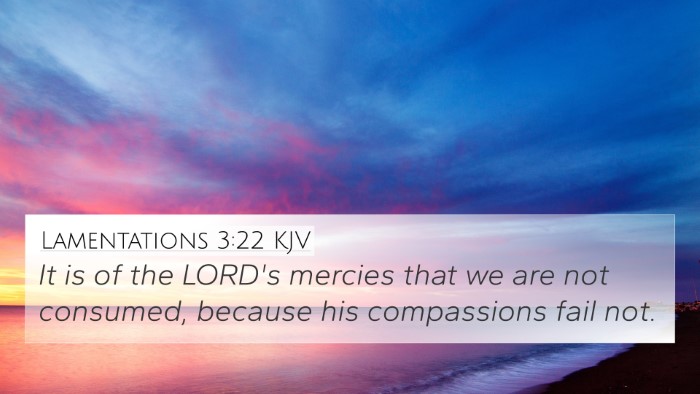
Lamentations 3:22 (KJV) »
It is of the LORD's mercies that we are not consumed, because his compassions fail not.
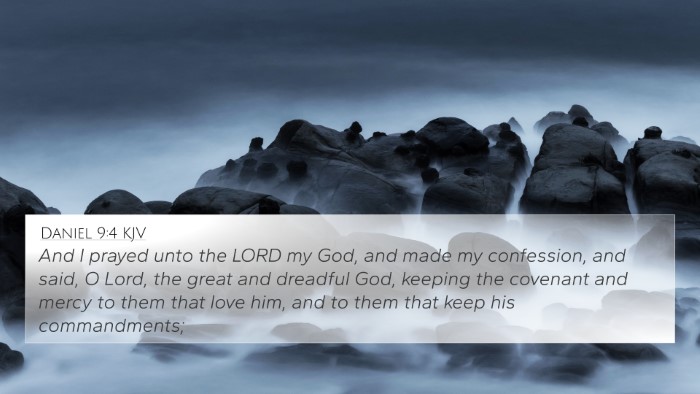
Daniel 9:4 (KJV) »
And I prayed unto the LORD my God, and made my confession, and said, O Lord, the great and dreadful God, keeping the covenant and mercy to them that love him, and to them that keep his commandments;
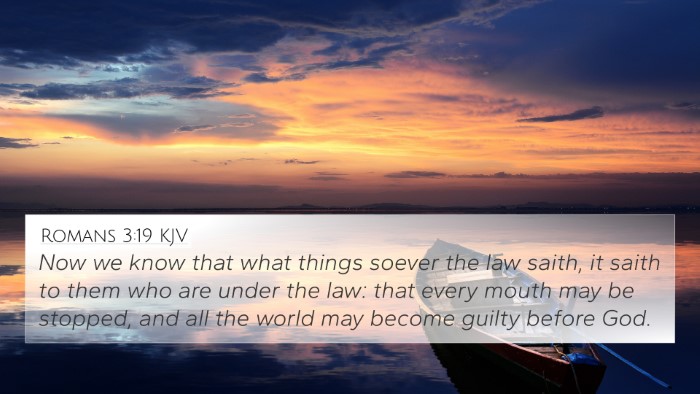
Romans 3:19 (KJV) »
Now we know that what things soever the law saith, it saith to them who are under the law: that every mouth may be stopped, and all the world may become guilty before God.
Ezra 9:10 Verse Analysis and Similar Verses
Understanding Ezra 9:10
Ezra 9:10 presents a critical moment in the post-exilic community of Israel where the prophet Ezra expresses deep concern over the spiritual and moral corruption present among the people. This passage reflects Ezra's earnestness in seeking God's guidance and recognizing the gravity of the situation. Below is a comprehensive interpretation and analysis of this verse, synthesizing insights from established public domain commentaries.
Verse Text
Ezra 9:10: "And now, O our God, what shall we say after this? For we have forsaken thy commandments."
Commentary Insights
Contextual Overview
In this section, Ezra is lamenting about the infidelity of the Israelites to God's covenant. Following the return from Babylonian captivity, they had recommitted to God's laws, but evidence of disobedience had surfaced, particularly through intermarriage with surrounding nations.
Matthew Henry's Commentary
Henry emphasizes Ezra's grief and shame at the disobedience of the people, demonstrating a recognition of the gravity of their sins. He points out that Ezra frames his question in a way that indicates despair about their situation while yearning for guidance from God. It is a plea for divine intervention, reflecting a deep understanding of the importance of adhering to God's instructions.
Albert Barnes' Commentary
Barnes notes that Ezra's question is rhetorical and serves to highlight the contrast between Israel's current state and God's expectations. He brings attention to the fact that the disobedience of the people leads to a breakdown in their relationship with God. This verse signifies a turning point where the community is called to acknowledge their sins and seek restoration through repentance.
Adam Clarke's Commentary
Clarke provides insight into the Hebrew meanings underlying this verse, illustrating the weight of abandonment of God's commandments. He stresses that Ezra's question indicates a turning point where the acknowledgment of sin was necessary for growth and revival within the community. Clarke explains that understanding the severity of their actions is crucial for spiritual renewal.
Thematic Connections
The themes present in Ezra 9:10 resonate throughout scripture, particularly regarding repentance, divine commandments, and restoration. To enrich our understanding, let’s examine relevant cross-references that illuminate these themes.
- Nehemiah 1:6-7: Ezra's sentiments echo Nehemiah's concern for Jerusalem's state, focusing on the widespread sin of God's people.
- 2 Chronicles 7:14: This passage emphasizes the need for humility and repentance among God's people to receive healing and restoration.
- Isaiah 59:2: Highlights how sin creates a barrier in one’s relationship with God, emphasizing the need for repentance.
- James 4:8: Encourages drawing near to God as a response to recognizing one’s shortcomings.
- Hosea 14:1: A call for Israel to return to God after straying, similar to the plea seen in Ezra.
- Romans 3:23: Acknowledges that all fall short, bringing the universality of sin into perspective.
- 1 John 1:9: Offers assurance that confession leads to forgiveness, reinforcing the theme of repentance seen in Ezra.
- Psalms 51:10-13: David's plea for a clean heart serves as a model of repentance applicable to Ezra’s situation.
- Micah 6:8: Illustrates what the Lord requires of His people, emphasizing justice and walking humbly with God.
- Revelation 2:5: A call to churches to remember their first love, reflecting the ongoing requirement for God's people to maintain fidelity.
Lessons from Ezra 9:10
This verse teaches us the significance of recognizing our failings in relation to God's commandments and the importance of seeking His forgiveness. It highlights the necessity of communal accountability and the power of prayer in times of distress.
Personal Applications
- Reflection: Take time to reflect on areas of life where we may have strayed from God's commandments.
- Community Confession: Engage with others in sincere confession and accountability.
- Prayer for Guidance: Seek God's wisdom and guidance in making necessary changes in response to our recognition of sin.
Conclusion
Ezra 9:10 serves as a profound reminder of the importance of repentance and the need for God’s intervention in restoring our relationship with Him. By exploring this verse, we not only understand its immediate implications for Ezra and his community but also our own spiritual journeys. This engagement with scripture through cross-referencing and thematic connections allows us to deepen our understanding of God's character and requirements for His people.

